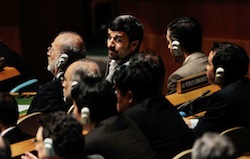UN Security Council To Vote on Iran Sanctions Today
June 9, 2010
Featured Image
Today's top nuclear policy stories, with excerpts in bullet form.
Stories we're following today, Wednesday, June 9, 2010:
U.N. is Set to Vote on Iran Sanctions - The New York Times [link]
- The United Nations Security Council is scheduled on Wednesday to impose new sanctions against Iran over its nuclear program, taking aim at the financial might of the Revolutionary Guards Corps as well as Iran’s military and nuclear industries with the addition of 41 enterprises to the blacklist.
- The number of entities listed is still roughly twice that on any previous resolution.
- 15 companies listed are linked to the Islamic Revolutionary Guards Corps. The most prominent company, Khatam al-Anbiya Construction, has won billions of dollars in civil and military projects, including a secret nuclear enrichment facility near the holy city of Qum.
- “We have never gone after the sprawling I.R.G.C. commercial enterprise in quite the same way,” said one United States official not authorized to comment publicly on the negotiations.
What is Nuclear Security Worth in 2011? - The Fissile Materials Working Group in The Bulletin of the Atomic Scientists [link]
- If the car bomb in Times Square contained just one of the tens of thousands of radioactive sources that exist in the U.S. and it had successfully detonated, this American landmark would be uninhabitable for months or years to come.
- That is why it is essential for Congress to join with the Obama administration to make sure that terrorists cannot get their hands on these dangerous materials.
- Tackling this threat will take real money--more than we have spent to date--and continued political commitment.
- The president has requested a $320 million increase for nuclear security activities in the fiscal year 2011 budget, and Congress will need to act on that request to ensure nuclear materials stay out of the hands of terrorists.
Four Reasons the US Coule Get Israel to Talk About a Middle East Free of Weapons of Mass Destruction - Christian Science Monitor [link]
- The furor over Israel’s attack on the Gaza-bound flotilla has overshadowed a more hopeful recent development. Two days before the flotilla fiasco, a UN conference aimed at strengthening the Nuclear Nonproliferation Treaty endorsed a plan for ridding the Middle East of all nuclear, chemical, and biological weapons.
- As planning for a 2012 region-wide conference to discuss a WMD-free zone begins, the United States must insist on linking it to a regional peace process.
- Why? Because Israel, which is widely believed to possess nuclear weapons, will not abandon its most powerful deterrent while some of its neighbors refuse to establish diplomatic relations.
- And without Israel’s participation, there can be no meaningful talks on creating a WMD-free zone in the Middle East.
- A nuclear-capable Iran will require Israel to adopt an active, unambiguous nuclear posture – a dangerous and costly prospect that Israel would rather avoid. Israel has strong incentives to use regional security discussions to constrain Iran’s nuclear development.



